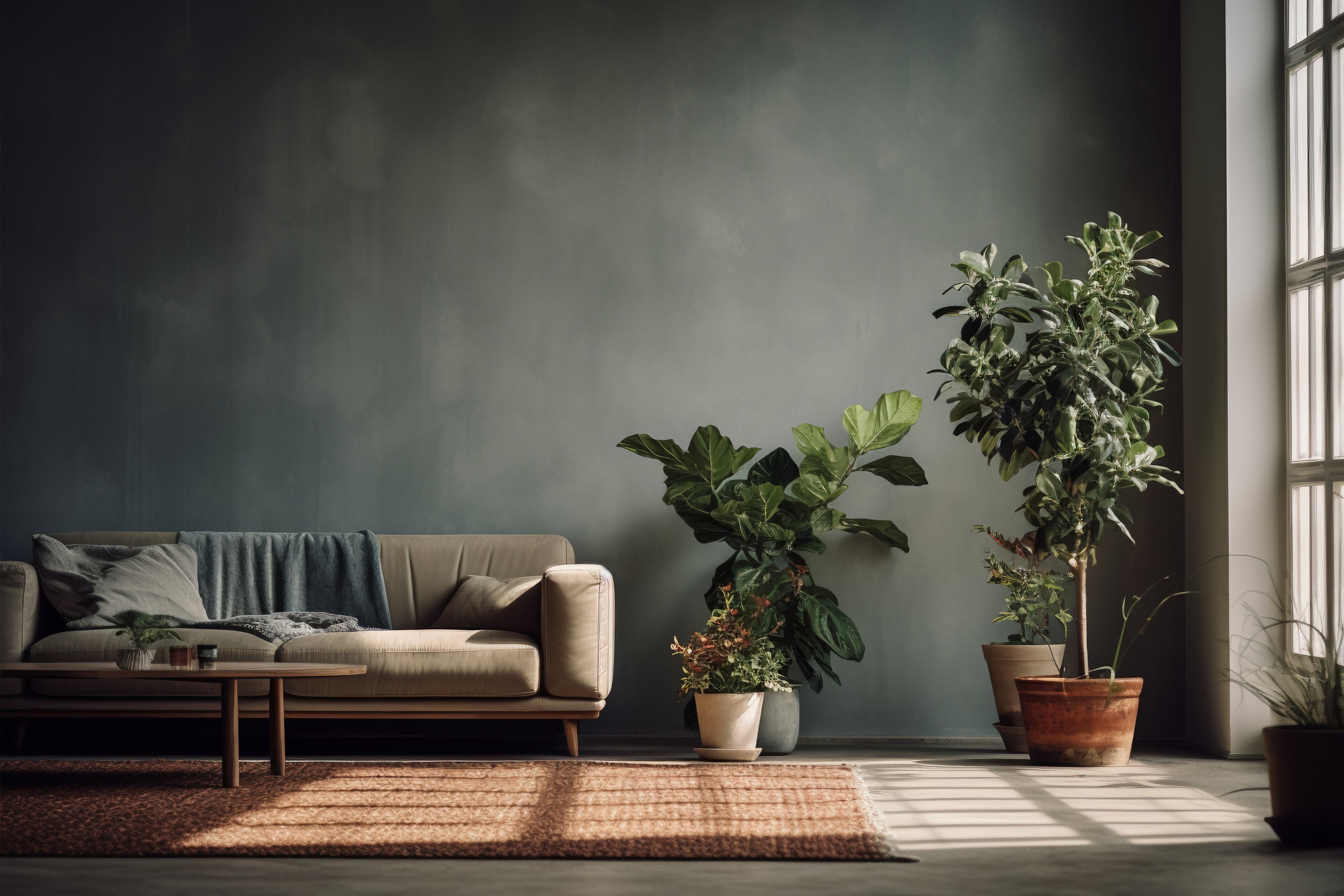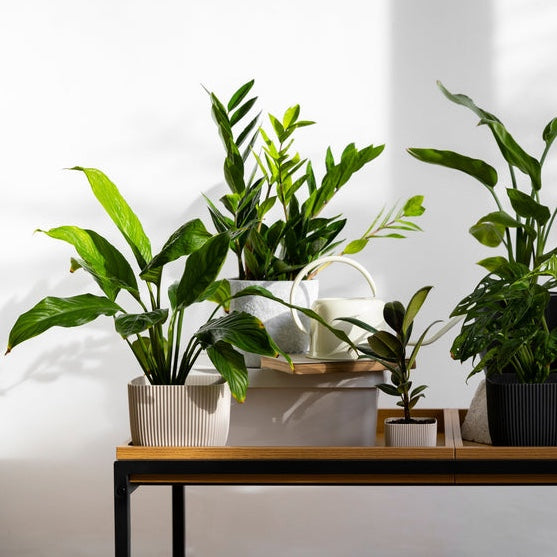Office plants have been proven to increase well-being, boost productivity, and create a pleasant working environment. However, not every workplace offers the light, time, or the right environment for real plants. The solution: high-quality artificial plants for the office that look deceptively real and require no maintenance.

The best plants for the office
Artificial plants add fresh accents to any office environment—whether on the desk, on the shelf, or as a statement piece in the entryway. We present the best models for different office spaces.
Small office artificial plant for the desk
Even in small spaces, you don't have to miss out on greenery. Compact artificial plants bring freshness and style directly to the workplace.
Artificial Agave Plant: This compact plant adds clean lines to your desk thanks to its distinctive leaf shape. Perfect for modern offices, structured workspaces, and urban settings.


Elegant artificial plants for shelves & windowsills
Narrow windowsills or open shelves provide ideal spaces for subtle green accents. Stylish artificial plants can be used to create targeted highlights.
Artificial Yulan Magnolia: The large-leaved Yulan magnolia with its white-green nuances brings elegance to open shelves or windowsills and is perfect for creative or consulting offices.

Artificial Sansevieria: Thanks to its straight leaves, this upright plant brings structure to small corners or window spaces.

Representative office artificial plants for the entrance area
First impressions count—especially in everyday business. These large artificial plants lend any entrance area a welcoming and professional look.
Artificial Bamboo Tree: With its dense, green leaves, this artificial bamboo creates a friendly and inviting look. Its Asian-inspired design is ideal for reception areas or waiting areas.

Artificial Ficus Benjamini: A classic among office artificial plants: The Benjamin tree radiates seriousness and naturalness – perfect for law firms or practice rooms.

Appetizing artificial office plants for canteens
Some plants, especially those with fresh, warm and natural colors, have been proven to stimulate the appetite and are ideal for canteens and kitchens.
Artificial Cordyline Fruticosa: With its colorful, reddish leaves, the artificial club lily adds fresh accents to break and dining areas.

Artificial Olive Tree: The Mediterranean touch of the artificial olive tree creates a warm, relaxed atmosphere, while the lifelike olives radiate a natural freshness.

Artificial plant office: Advantages of artificial plants over real plants
Artificial plants for the office are now far more than just a substitute for living plants. Thanks to their handcrafted nature, they look deceptively real and offer numerous practical advantages, especially in office environments where daylight, time, or resources are limited.
The color green has been proven to have a positive effect on the work environment. Studies show that green elements reduce stress, promote concentration, and enhance overall well-being.
Artificial plants are also economically attractive in the long run. While high-quality models are somewhat more expensive to purchase, they eliminate all ongoing maintenance costs. Sustainable versions are now also available, made from recycled materials and actively contributing to environmental protection.
Artificial plants are also hygienic and allergy-friendly—they neither release pollen nor form mold, which is a decisive advantage in open-plan offices or for employees with sensitive skin. Cleaning is incredibly easy: A damp cloth or occasional dusting is sufficient.

Artificial plant office: design tips for a harmonious office ambience
Artificial plants are especially effective when they are thoughtfully integrated into the room concept. Rather than being placed randomly, they should be used intentionally to specifically support the feel-good atmosphere in the office.
A tried-and-tested method is to combine different sizes and plant types. Small artificial plants on the desk, medium-sized ones on windowsills, and larger ones in corners or as room dividers create a lively, balanced overall look. A few well-placed plants often have a more powerful effect than a multitude of scattered decorative elements.
- Combine different sizes and plant species
- Choose pots that match the interior (e.g. matte, concrete look, terracotta)
- Set selective accents instead of overloading
- Pay attention to harmonious color schemes (tone-on-tone or contrasts)

Criteria for selecting artificial plants for the office
To avoid compromises when choosing the right plant for your office, your artificial plants should meet all of the following criteria.
|
criterion |
Description |
|
High-quality & true to nature |
Materials such as textile fabric or high-quality plastic appear particularly real |
|
Style & Design |
Matching the office furnishings (modern, classic, minimalist) |
|
Size & space requirements |
Choose small or large models depending on the area |
|
Care |
Artificial plants do not require maintenance – but occasional cleaning |
|
hygiene |
Antistatic models and low-dust materials |
Artificial plant office – high-quality & true to nature
The quality of an artificial plant determines whether it is perceived as a stylish interior design element or a cheap replica. High-quality models are characterized by lifelike leaf structures, realistic color gradients, and meticulous attention to detail.
Handmade plants are particularly appealing, with their natural feel and natural light reflection. Those who value quality are investing in a long-lasting and aesthetic solution that will impress even the most discerning eye and permanently enhance the office.

Plants for the office combine style and design
Artificial plants not only serve a decorative function in the office, but can also contribute to the corporate design. They can be coordinated with the colors, materials, and shapes of the office furnishings, thus reinforcing the company's visual identity.
While classic green plants like ficus or snake plant convey calm and sobriety in neutral spaces, more exotic plants or flowering plants like orchids add vibrant accents. When combined correctly, a harmonious overall look emerges that exudes professionalism, creativity, or openness.

Pay attention to size and space requirements
Whether plants for the office appear subtle or dominant depends largely on their size and the available space. An oversized plant on a small desk can quickly appear cluttered, while one that's too small will get lost in a large entryway.
Therefore, you should realistically assess your space requirements and tailor the plant size to the room dimensions. The number of plants also plays a role: Several small plants in a large office can have a better effect than a single large one. It's important that the plant is harmoniously integrated as an integral part of the office architecture.

Artificial plant office – easy care
A major advantage of artificial plants in the office is their minimal maintenance. They require neither light nor water and remain in shape permanently, without wilting leaves or pest infestation. To keep them looking fresh and attractive, they should be dusted regularly. A soft microfiber cloth or feather duster is usually sufficient.
If they get heavily soiled, easy-care artificial plants can be gently wiped clean with a damp cloth. Unlike real plants, they don't require daily attention, which is ideal, especially in stressful work environments or departments without a dedicated workstation.

Hygiene – Important for allergy sufferers
In modern offices, especially in open-plan offices or shared workspaces, hygiene plays a key role. Artificial plants offer clear advantages: They don't release pollen, don't attract insects, and don't form mold.
This makes them particularly suitable for allergy sufferers or those with sensitive respiratory tracts. Artificial plants not only create a sense of visual freshness but also support a healthy indoor climate in everyday office life.

VASANTA – High-quality, handmade plants for the office
Whether for minimalist workplaces, representative reception areas or creative meeting rooms: VASANTA plants blend harmoniously into any office interior and bring stylish freshness without any maintenance effort.
VASANTA stands for handcrafted plant models that impress with their lifelike appearance and meticulous craftsmanship. Every detail, from the leaf structure to the root base, is precisely crafted to create an authentic overall appearance.
- Sustainable production for a plastic-free future
- True to nature and durable
- Easy-care
- Handmade unique pieces
- Fast delivery with Swiss Post
Discover lifelike artificial plants from VASANTA and make a statement for environmental protection.

Frequently asked questions about plants for the office
Why should you prefer artificial plants to real plants in the office?
Artificial plants are particularly practical in everyday office life because they require no maintenance, look consistently fresh regardless of location, and don't require any special conditions such as light or humidity. They're a reliable solution, especially in work environments with changing usage, little daylight, or without regular maintenance. They also don't cause allergies, don't attract insects, and are easy to keep clean.
Can artificial plants be as decorative as real plants?
Yes, modern artificial plants are visually almost indistinguishable from real plants. High-quality models feature finely crafted leaves, natural color gradients, and realistic surfaces. The variety of shapes and types also allows for targeted interior design. Artificial plants for the office offer the added advantage of staying in perfect condition for a long time, without wilting or drying out.
Which plants are best suited for the office?
Smaller plants like agaves or orchids look great on desks. Slender plants like the Yulan Magnolia or the Snake Plant (Sansevieria) are recommended for windowsills and shelves. Larger plants like bamboo trees or Ficus Benjamini are particularly inviting in entryways. In cafeterias or common rooms, Mediterranean plants like the olive tree create a pleasant atmosphere. The key is the combination of size, impact, and appropriate style.
How often do real office plants need to be watered?
Depending on the species and location, real plants require regular watering, usually once or twice a week. Light conditions, temperature, and humidity must be taken into account. Dry conditions, drafts, or a lack of natural light can increase the amount of care required. Especially in offices with many employees or without defined responsibilities, watering can easily be neglected. Artificial plants, on the other hand, require no irrigation and remain beautiful over time.
Are there sustainable artificial plants for the office?
Yes, VASANTA uses recycled ocean plastic waste to create high-quality and attractive plastic pots. All VASANTA pots, which hold plants, are made from 100% recycled plastic.

